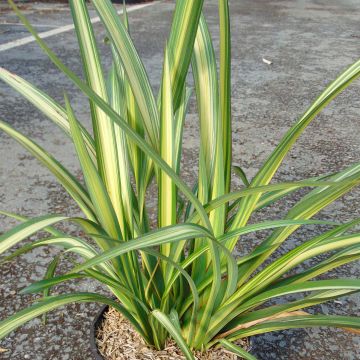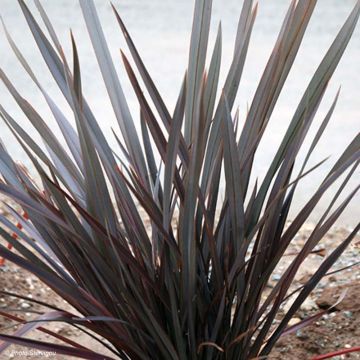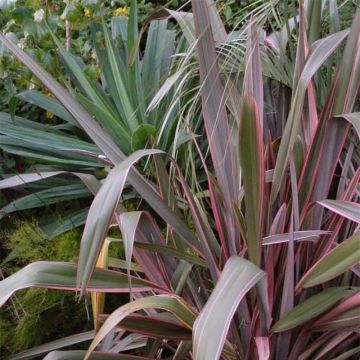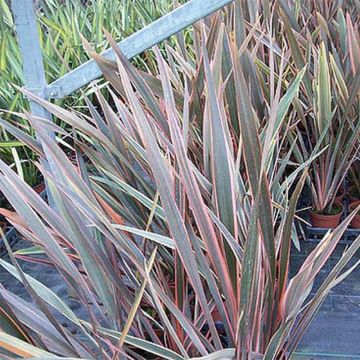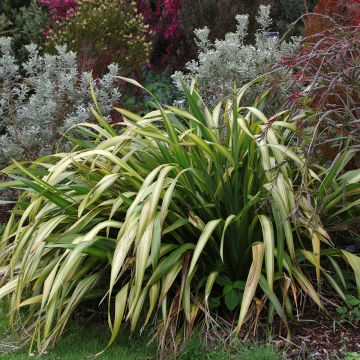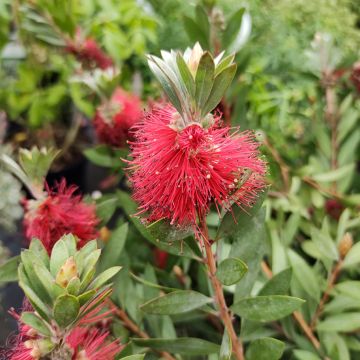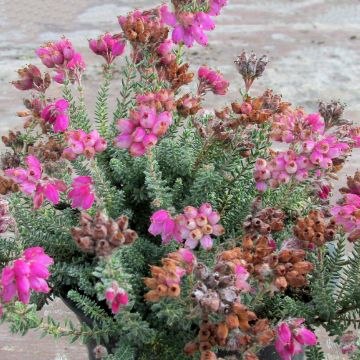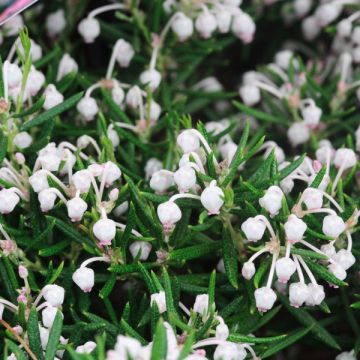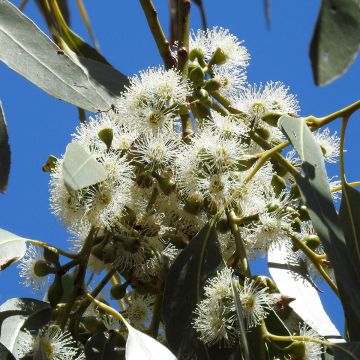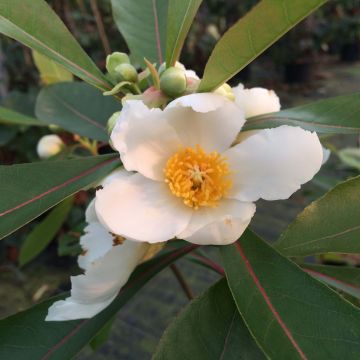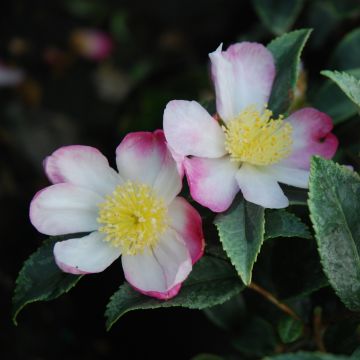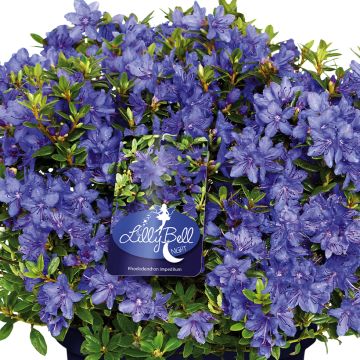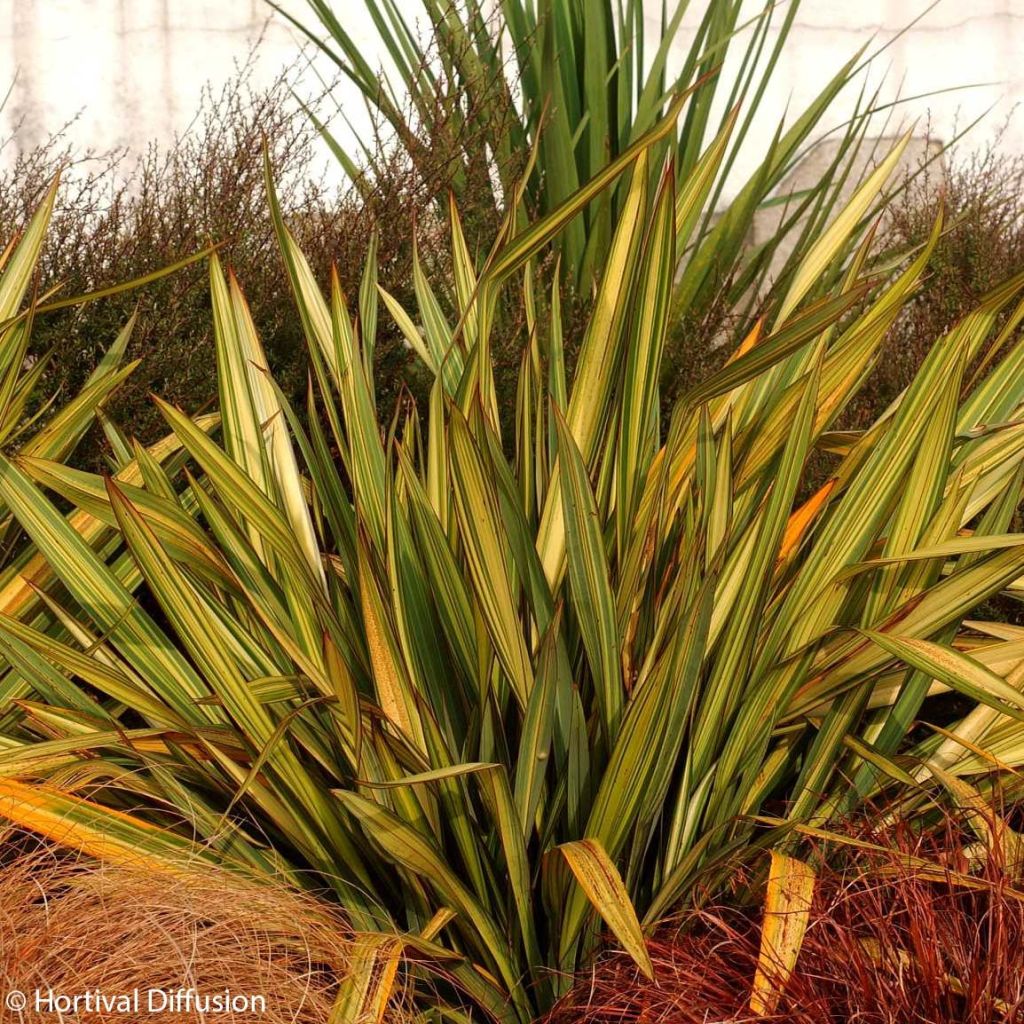

Phormium tenax Apricot Queen - New Zealand Flax
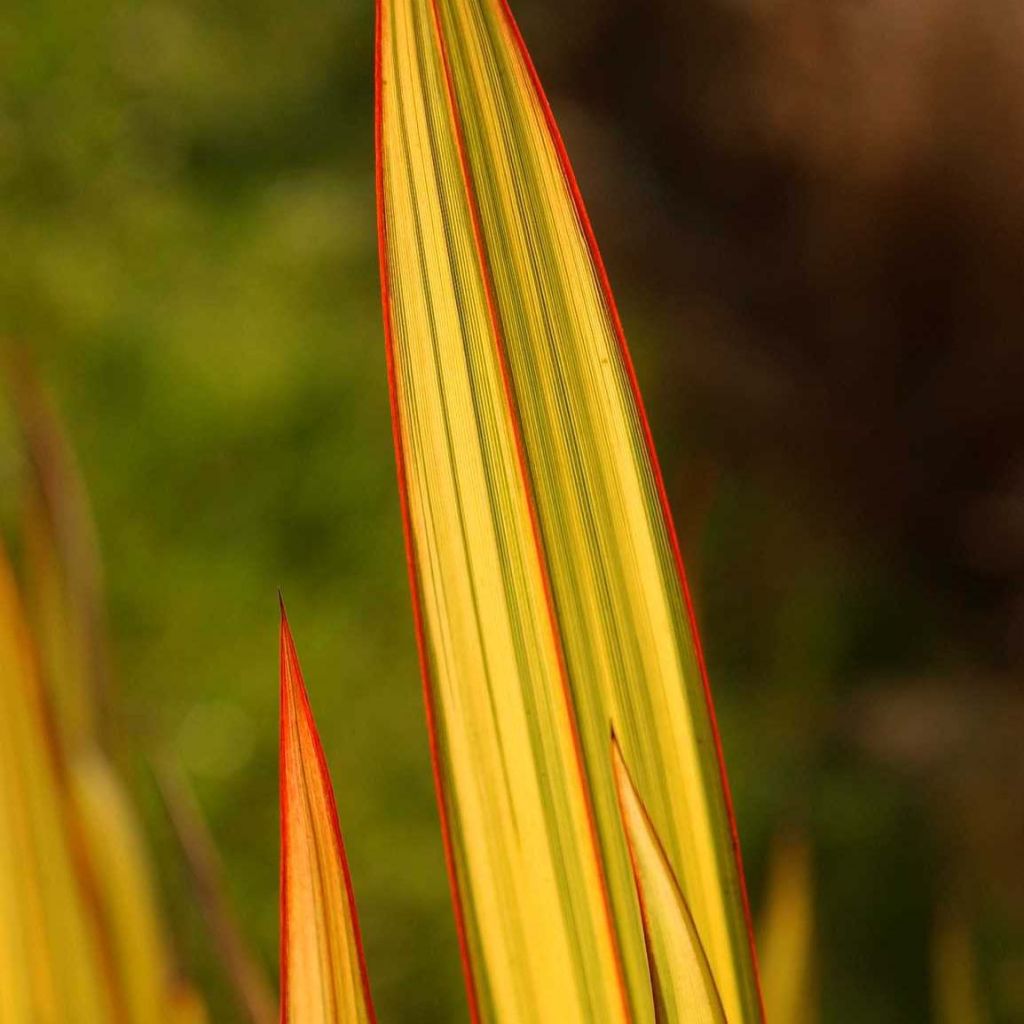

Phormium tenax Apricot Queen - New Zealand Flax
Phormium tenax Apricot Queen - New Zealand Flax
Phormium x tenax Apricot Queen
New Zealand Flax, Flax Lily
The plant arrived in perfect condition as a replacement for another one that I still haven't received since the beginning of September. I would have liked it to be more rooted in its 3/4 litre pot, so expensive for the little plant growth.
AndréeB, 19/09/2024
This item cannot be shipped to the selected country
Delivery charge from €5.90
More information
Schedule delivery date,
and select date in basket
This plant carries a 24 months recovery warranty
More information
We guarantee the quality of our plants for a full growing cycle, and will replace at our expense any plant that fails to recover under normal climatic and planting conditions.
From €5.90 for pickup delivery and €6.90 for home delivery
Express home delivery from €8.90.
Does this plant fit my garden?
Set up your Plantfit profile →
Description
Phormium x tenax Apricot Queen is a variety of New Zealand Flax that is beautifully coloured, of impressive stature and relatively hardy. Its young leaves are striped with different shades of yellow and green and edged with red, then they become olive green to bronze, striped with yellow, apricot orange and cream. Gathered in a fan shape and forming an imposing clump, with a very slightly trailing habit. This evergreen plant offers an exotic and modern aspect to the garden, throughout the year, including during its summer flowering with upright spikes, adorned with tubular red-orange flowers. Whether planted individually or in group, this architectural perennial is ideal for coastal regions. It will also thrive in a large container, to be overwintered in cool climates.
The 'Apricot Queen' New Zealand Flax belongs to the agave family. It is a New Zealand horticultural hybrid obtained in 1985 by Margaret Jones. This superb rhizomatous perennial develops into a wide non-spreading clump. With an upright and slightly arching habit, it reaches a minimum height of 1.50m depending on growing conditions, with a spread of 1 to 1.50m. The ribbon-like leaves are wide, very long, slightly stiff and pointed at their tips. Their richly variegated colours of green, yellow, cream and rust evolve over time, taking on more orange tones at the end of the season and in winter. Tall flower stems of about 2m (6 ft 7 in) appear from May to July, depending on the climate, overhanging the foliage clump. They are green, tinged with purple, in the form of curved tube-shaped flowers, which turn more or less bright red when mature. This flowering attracts certain birds and many pollinating insects.
Phormium Apricot Queen is a plant of great ornamental value, suited for large beds or large rockeries in mild climates. Whether used individually or planted in groups, it structures the space and brings both an exotic and contemporary charm to the garden. Like large grasses, it is also a wonderful perennial for a modern garden with clean lines. In colder regions, it can be placed in a very large pot on the terrace or balcony, to admire its presence during the growing season, and overwinter frost-free in a cold greenhouse or a poorly heated conservatory. In an urban garden, it softens concrete structures. For an exotic and contrasting atmosphere, it can be associated, for example, with Leptospermum scoparium, a pink to red ball-shaped plant that blooms in summer, Helichrysum rosmarinifolium 'Silver Jubilee', Pittosporum tenuifolium Tom Thumb, or even Olearia macrodonta 'Major', plants also originating from the coast.
The Maoris use Phormiums as we use linen, for their fibres used in the textile industry. This is probably where the vernacular name 'New Zealand Flax' comes from.
Report an error about the product description
Phormium tenax Apricot Queen - New Zealand Flax in pictures


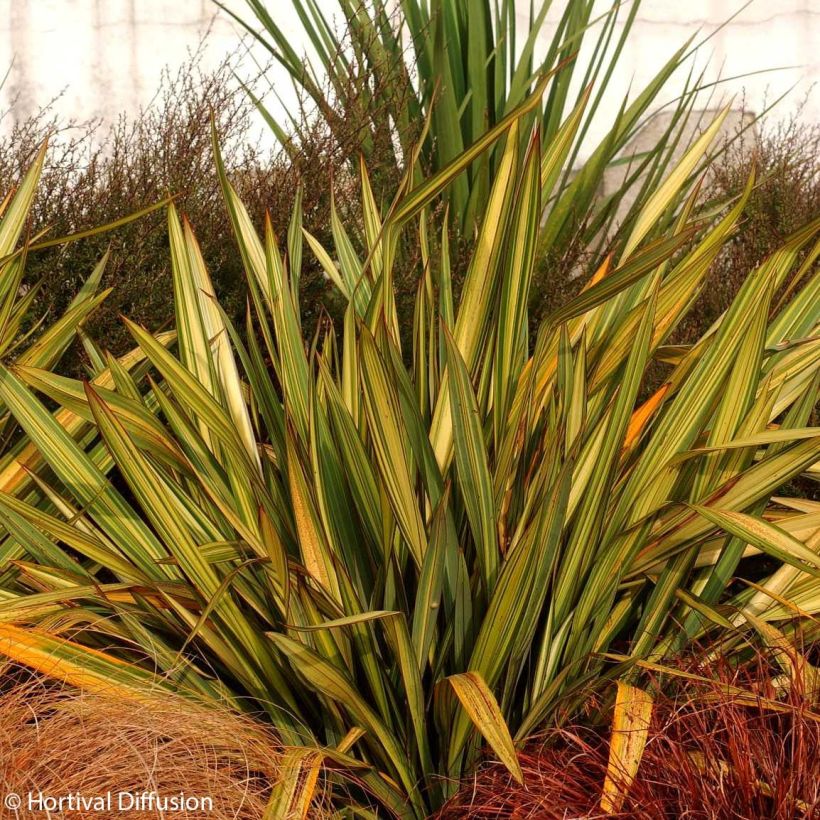

Plant habit
Flowering
Foliage
Botanical data
Phormium
x tenax
Apricot Queen
Agavaceae
New Zealand Flax, Flax Lily
Cultivar or hybrid
Other Phormium
Planting and care
Phormium 'Apricot Queen' is a moderately hardy plant that will only be cultivated in open ground in regions where frosts do not drop below -8°C (17.6 °F). Everywhere else, pot cultivation is more suitable, which will allow over-wintering sheltered from frost, in a cool and bright room.
Plant your Phormium in a container or a large pot whose bottom has been filled with gravel, pottery shards, or clay balls. The planting mix should be fertile and well-draining (1/3 leaf compost, 1/3 compost, and 1/3 ordinary garden soil, enriched with a handful of bonemeal).
Place the plant in full sun. Water abundantly during the growth period so that the soil never completely dries out. Feed the plant with special "green plant" fertilizer diluted in the watering water, once a month. In winter, reduce water and fertilizer inputs, and let the soil dry superficially between waterings.
In regions where the climate is mild and frosts are moderate and short, plant the Phormium in open ground, in full sun, in a very well-drained and fertile soil.
In summer, make sure the plant does not lack water. In winter, it relies on rainwater.
In case of a severe frost forecast, install a thick mulch at the base of the plant and cover it with fleece.
In the coldest regions, a thick mulch will help protect the roots from freezing in winter.
Planting period
Intended location
Care
-
, onOrder confirmed
Reply from on Promesse de fleurs
Evergreen shrubs
Haven't found what you were looking for?
Hardiness is the lowest winter temperature a plant can endure without suffering serious damage or even dying. However, hardiness is affected by location (a sheltered area, such as a patio), protection (winter cover) and soil type (hardiness is improved by well-drained soil).

Photo Sharing Terms & Conditions
In order to encourage gardeners to interact and share their experiences, Promesse de fleurs offers various media enabling content to be uploaded onto its Site - in particular via the ‘Photo sharing’ module.
The User agrees to refrain from:
- Posting any content that is illegal, prejudicial, insulting, racist, inciteful to hatred, revisionist, contrary to public decency, that infringes on privacy or on the privacy rights of third parties, in particular the publicity rights of persons and goods, intellectual property rights, or the right to privacy.
- Submitting content on behalf of a third party;
- Impersonate the identity of a third party and/or publish any personal information about a third party;
In general, the User undertakes to refrain from any unethical behaviour.
All Content (in particular text, comments, files, images, photos, videos, creative works, etc.), which may be subject to property or intellectual property rights, image or other private rights, shall remain the property of the User, subject to the limited rights granted by the terms of the licence granted by Promesse de fleurs as stated below. Users are at liberty to publish or not to publish such Content on the Site, notably via the ‘Photo Sharing’ facility, and accept that this Content shall be made public and freely accessible, notably on the Internet.
Users further acknowledge, undertake to have ,and guarantee that they hold all necessary rights and permissions to publish such material on the Site, in particular with regard to the legislation in force pertaining to any privacy, property, intellectual property, image, or contractual rights, or rights of any other nature. By publishing such Content on the Site, Users acknowledge accepting full liability as publishers of the Content within the meaning of the law, and grant Promesse de fleurs, free of charge, an inclusive, worldwide licence for the said Content for the entire duration of its publication, including all reproduction, representation, up/downloading, displaying, performing, transmission, and storage rights.
Users also grant permission for their name to be linked to the Content and accept that this link may not always be made available.
By engaging in posting material, Users consent to their Content becoming automatically accessible on the Internet, in particular on other sites and/or blogs and/or web pages of the Promesse de fleurs site, including in particular social pages and the Promesse de fleurs catalogue.
Users may secure the removal of entrusted content free of charge by issuing a simple request via our contact form.
The flowering period indicated on our website applies to countries and regions located in USDA zone 8 (France, the United Kingdom, Ireland, the Netherlands, etc.)
It will vary according to where you live:
- In zones 9 to 10 (Italy, Spain, Greece, etc.), flowering will occur about 2 to 4 weeks earlier.
- In zones 6 to 7 (Germany, Poland, Slovenia, and lower mountainous regions), flowering will be delayed by 2 to 3 weeks.
- In zone 5 (Central Europe, Scandinavia), blooming will be delayed by 3 to 5 weeks.
In temperate climates, pruning of spring-flowering shrubs (forsythia, spireas, etc.) should be done just after flowering.
Pruning of summer-flowering shrubs (Indian Lilac, Perovskia, etc.) can be done in winter or spring.
In cold regions as well as with frost-sensitive plants, avoid pruning too early when severe frosts may still occur.
The planting period indicated on our website applies to countries and regions located in USDA zone 8 (France, United Kingdom, Ireland, Netherlands).
It will vary according to where you live:
- In Mediterranean zones (Marseille, Madrid, Milan, etc.), autumn and winter are the best planting periods.
- In continental zones (Strasbourg, Munich, Vienna, etc.), delay planting by 2 to 3 weeks in spring and bring it forward by 2 to 4 weeks in autumn.
- In mountainous regions (the Alps, Pyrenees, Carpathians, etc.), it is best to plant in late spring (May-June) or late summer (August-September).
The harvesting period indicated on our website applies to countries and regions in USDA zone 8 (France, England, Ireland, the Netherlands).
In colder areas (Scandinavia, Poland, Austria...) fruit and vegetable harvests are likely to be delayed by 3-4 weeks.
In warmer areas (Italy, Spain, Greece, etc.), harvesting will probably take place earlier, depending on weather conditions.
The sowing periods indicated on our website apply to countries and regions within USDA Zone 8 (France, UK, Ireland, Netherlands).
In colder areas (Scandinavia, Poland, Austria...), delay any outdoor sowing by 3-4 weeks, or sow under glass.
In warmer climes (Italy, Spain, Greece, etc.), bring outdoor sowing forward by a few weeks.

































